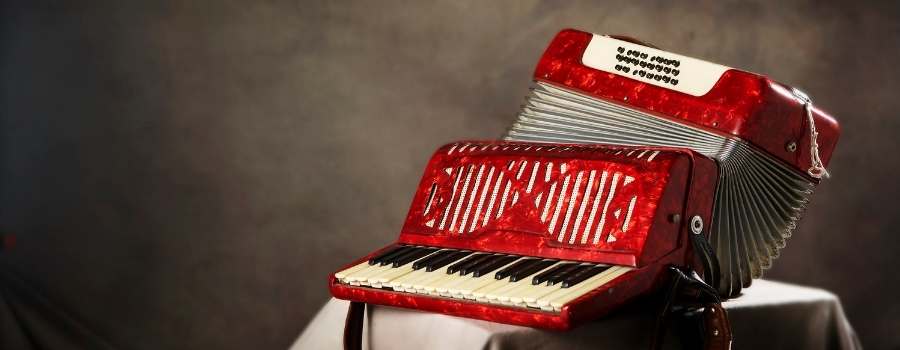
Accordions need tuning just like any other instrument. The type of tuning and how often it needs to be done depends on the make and model of the accordion but it’s best to take your instrument to a professional to have it done properly. If you’re unsure if your instrument needs tuning, you can always check by playing a few notes and listening for any discrepancies in pitch…a tuner is also helpful here.
I this article I want to cover all the aspects of tuning an accordion you’ll need to know…how often it should be done, how to tell if your accordion is out of tune, and how much it will cost to have your instrument tuned. If you’re an accordion owner, use this information to keep your instrument in pristine condition.
Do Accordions Need To Be Tuned?
In general, accordions need to be tuned and, more specifically, they need to be tuned to a certain key otherwise they will sound out of tune. Most accordions are tuned to either C or Bb major.
A fifth is a musical interval five notes away from the root of a scale. It is created by playing two notes that are a fifth apart. For example, if your accordion is tuned in the key of C, it should follow a fifth up to the G note (C-D-E-F-G). If your instrument is out of tune, the fifth will be broken and sound dissonant to the ear.
To tune an accordion, you’ll have to adjust the length of the reeds within the instrument. This is done by moving small metal tabs on the reeds, which alter the pitch of the notes. However, this is incredibly complicated and should not be attempted by an amateur. Instead, always take your accordion to a professional instrument maker to have it tuned.
Attempting to tune your own accordion can damage the instrument and make it unplayable. Instead, be patient and pay to have your accordion maintained by a professional.
How Often Should Accordions Be Tuned?
Generally, you should have your accordion tuned every 6 – 12 months, depending on how often you perform or practice. Other factors, such as humidity and age of the instrument, can also effect how often you should get your accordion tuned.
It’s a good idea to develop your ear a bit, meaning being able to hear when a note is off. Until you’re comfortable with recognizing your instruments tuning, check it with an electronic tuner.
To keep your instrument in tune longer, keep the following things in mind:
- Environment – The environment can affect your accordion in a few ways. If it is very dry, the accordion will fall out of tune quickly but if it is very humid, the accordion may become more difficult to tune. Temperature can also affect the tuning of an accordion, as extreme temperatures can cause the instrument to expand or contract.
- Playing – Although it’s best to practice as much as possible, the more you play your instrument, the sooner it will slip out of tune. As you pass air through the reeds, they slowly shift and will eventually move out of place, affecting the tone of your instrument.
- Quality of the Instrument – Higher quality accordions are less likely to slip out of tune because their internal parts are made to a higher standard. Cheap instruments may be a good place to start learning but you’ll find that they struggle to stay in tune and require regular maintenance.
When you’re done playing, wipe away any fingerprints or grime and place it back in its case. To avoid having to tune your accordion more often, always keep it in a safe place away from heat sources, windows, or damp areas.

What’s The Best Way To Check An Accordion’s Tuning?
Generally, the best way to check an accordion’s tuning is to use a chromatic tuner. Chromatic tuners are an electrical device used to tune a variety of musical instruments. It displays the pitch of a note as it is played, allowing the user to adjust the pitch of the note until it is in tune.
Although you might not be able to change the pitch on your own, it will at least allow you to see if each note is in tune with the others. If you find that any of the notes are drastically out of tune, consider taking your instrument to a professional accordion maker to have it checked.
The fact that you can’t readily adjust the tuning of an accordion like you can with a guitar or saxophone brings up a good point I feel new accordion players should understand when playing with musicians. Since you play the instrument that is the most difficult to tune, the other musicians need to tune their instruments to you. This makes it all the more important to have your accordion tuned whenever you feel like it’s starting to sound off.
How Long Does It Take To Tune An Accordion?
Typically, it takes a professional an hour to perform a full tuning on an accordion. This can be longer or shorter depending on how out of tune your instrument is. If it’s a minor tuning problem, they will perform a spot tuning which takes about 20 minutes, otherwise a full tuning will be performed.
Spot tunings make small adjustments to the length and position of certain reeds, mainly if they’re past a certain tuning. After a spot tuning, some reeds may remain slightly out of tune but not enough to affect the sound of your playing.
During a full tuning, the tuner will check every reed and adjust them until they are perfectly in tune. They will start with the middle reeds and tune them to concert pitch before moving on to the tremolo reeds. Once the tremolo reeds are in relative tune to the middle reeds, the tuner will then fine-tune all of the reeds once more to guarantee that they’re in perfect pitch.
How Much Does It Cost To Tune An Accordion?
In general, accordion tuners will charge $100 to $200. The price can be a little lower in large cities with prominent music scenes where there may be some competition among instrument shops. On the other hand the price can go even higher in locations where tuning accordions is a truly niche skill.
If you live in a rural area with few classical musicians or instrument makers, you’ll likely have to send your accordion off to be tuned. This will cost far more and could also take up to a week. Therefore, if you’re considering learning the accordion, be sure to find a professional teacher and tuner to make the process easier.
Final Thoughts
A properly tuned accordion is essential to getting the best sound from the instrument. There are a number of factors that can affect the tuning of an accordion, so it is important to have a good understanding of how each one affects the sound. If your instrument is out of tune, be sure to take it to a professional tuner to have it maintained.

